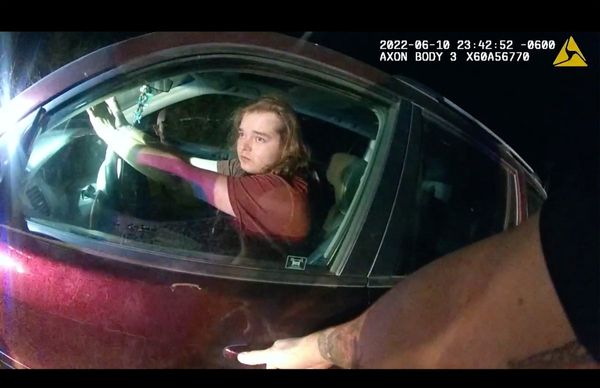Seatbelts have been legally required for passengers since 1983 and the National Highway Traffic Safety Administration estimates that 90% of Americans always buckle up. However, that doesn’t seem to hold true for the country’s four-legged friends, as a the American Automobile Association (AAA) reports that only 16% of Americans secure their dogs while driving. Lindsey Wolko, founder of the non-profit Center for Pet Safety, thinks that’s a huge mistake.
“Not only are pets a leading cause of distraction, but just like human occupants, our pets can suffer serious injuries in a sudden acceleration and deceleration or crash,” says Wolko. She also points out that unrestrained pets can be a problem after an accident has occurred, as they’re often frightened, hurt and scared, making it difficult for first responders to properly do their jobs. The Center for Pet Safety was established in 2011 and developed the first safety standards for dog harnesses, crates and carriers.

Gunner Kennels founder and CEO Addison Edmonds, 32, came to a similar realization as Wolko. The idea to create a line of durable and car-safe kennels occurred to him while driving when he looked in the rearview mirror of his car and realized his dog’s kennel had tipped. After realizing there wasn’t a strong enough kennel on the market, he started the company in 2013 and named it after his chocolate lab, Gunner. He used seed money from a local advertising company he started in college to fund the venture. When he ran out of funds, he borrowed the final $600 he needed for patent applications from his now-wife Emily, who is one of 12 full-time employees at the company.

To build the first prototype, Edmonds worked with engineers for more than a year to complete the design. While he knew the basics of what he wanted to create – a durable and comfortable dog crate for dogs in cars – his lack of background in the industry meant the process was labor-intensive. He was able to source a manufacturer who could physically build the crate after he finished the design process, but he still needed to figure out the rest of the elements. He attempted to design the door himself by creating a wire prototype, as most dog crates have, but found in testing that it wouldn’t suffice. “During our first crash test, the crash test dummy dog blew right through door,” says Edmonds. After that series of tests, they moved away from a wire door concept and instead decided on a welded nylon door with an aluminum frame, designed to withstand heavy impact. Because of this door (as well as the 125 other parts that make up each kennel), Gunner is the only manufacturer with a four- or five-star rating from the Center for Pet Safety, which allows them to advertise as a CPS-certified product. A CPS certification means that the kennel, when properly secured, will safely contain a dog in an accident at a speed of approximately 30 MPH.

That certification means a lot to Edmonds, as he intended the kennels to be safe above all else. As such, they put the first prototype of their G1 kennel, now called the G1 Intermediate, through a series of tests more trying than nearly any real-life conditions. They tested the kennels against forces of more than 4,000 pounds, dropped a 630-pound metal platform onto a crate from more than eight feet above, tossed the creates from a 200-foot cliff, and ran over the door with a 6,000-pound truck. The crate and its individual pieces survived all tests. The entire testing and development process took three years. The first kennel was introduced to the market in Summer 2015.


The G1 Intermediate sells for $499, though Edmonds admits he’d hoped to have the price point closer to $349. “After crash testing, we had to invest so much more into our door and other high-quality components that, unfortunately, our costs were too high, so we had to raise the retail price.” The high cost hasn’t deterred customers, as Gunner has sold more than 20,000 kennels since its launch. Sales more than doubled every year from 2015 to 2017.

Edmonds says that while their financial success after just a few years on the market is heartening, he also loves hearing stories of their kennels protecting man’s best friend. “We’ve had dozens of customers reach out to thank us for saving their dogs’ lives,” he says. Most recently a customer shared a story from an unfortunate accent in which his vehicle was hit by a semi-truck. Customer Charlie Barberini reported that his dog was inside a Gunner kennel that was launched more than 30 feet upon impact. “When I got to the kennel, the door was still locked,” says Barberini. “And my dog was scared, but fine.”
While only a few states have laws against transporting dogs unsecured in vehicles, both Edmonds and Wolko hope that more of the 44% of U.S. households that own dogs will consider pet safety while driving. “The worst outcomes for injured pets include torn ACLs, blunt force trauma, paralysis and death,” adds Wolko. “It’s heartbreaking for us to hear from devastated pet owners ‘we didn’t know this could happen.’”







